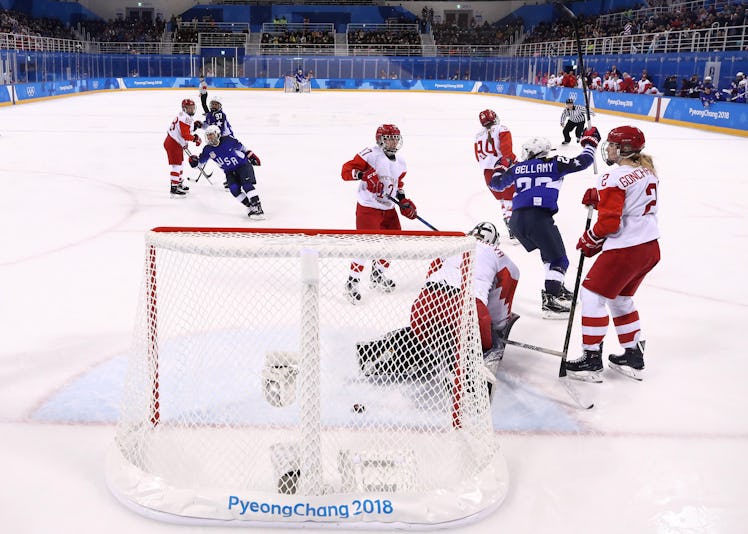
Here's How Russian Athletes Are Competing at the 2018 Winter Olympics
If you've been seeing the mysterious term "Olympic Athlete from Russia" (OAR) floating around the PyeongChang Olympics, you're not hallucinating. Russia was banned from attending the games, yet its athletes have been sweeping up medals left and right. Confused? Here's how Russian athletes are competing at the 2018 Winter Olympics.
Back in December, Russia was given a blanket ban from competing officially as a nation in the 2018 Olympic Games. In what was an historic decision, the International Olympic Committee (IOC) laid down the law after it concluded that Russia had carried out a state-backed doping operation at the 2014 Sochi Winter Games.
Under the ban, individual athletes from Russia would be allowed to compete if they were not found to have been involved in the doping scheme, but their medals would not represent the country. This year, approximately 169 Russian athletes were granted eligibility for the games after passing intense drug screenings, according to The New York Times. (Another count put that figure at 168.)
For those athletes allowed to compete, there is another hurdle to clear: Following the guidelines laid out by the IOC.
The rules and regulations around Russian eligibility show that the IOC is not messing around.
Following the December decision, the IOC laid out rules for how individual Russian athletes would be allowed to appear before the Olympic Games. As NPR reports, Russians would be given a special logo to wear, with the words "Olympic Athlete from Russia," their uniforms and equipment could use only this and or "OAR" as the text, and they would not be allowed to display any symbols or references to the country. Athletes were also banned from wearing all three Russian tricolors of white, blue, and red together in uniform, and officials' uniforms could only use the abbreviation "OAR." The complete 13-item list of rules gets down to the font size and lettering.
Russian athletes aren't competing for Russia.
If you've been tuning into the events, you've probably noticed "OAR" floating around. OAR stands for Olympic Athlete from Russia, the IOC-mandated abbreviation for Russian athletes, and has been used as a placeholder in lieu of a country name. (It's not, to be clear, the same thing as the band O.A.R., which if I had to guess, has probably gotten a lot of accidental follows and likes in the last two months.)
Even on social media, while other countries' flags appear as emoji on Twitter, OAR (which, no, is not a country), doesn't have any such icon.
That's because Russia as a country is not allowed at the games this year, so any participation by its nationals has to be treated separately.
The reason Russia was banned is serious.
Russia was found to have given its 2014 athletes a blend of performance-enhancing drugs, counter to Olympic policy. The country tampered with about 100 samples of urine prior during the drug testing process to cover up its tracks.
As part of the punishment, Russia's previous medals were also stripped from the record books, and the country was slapped with a $15 million fine. Neither the Russian flag nor its anthem would be acknowledged at the 2018 Olympic Games, and officials would be prohibited from attending.
Getting to the Olympics after the scandal hasn't been a cakewalk.
Despite the setbacks, a strong showing of Russian athletes is present at this Olympic Games. As the Times mentions, this year's team is comparable to previous games: in the 2010 Vancouver Olympics, Russia fielded 177 athletes.
Though some of the country's star figure skaters made it to PyeongChang, not all of them did. Per the Times, Russian skater Ekaterina Bobrova said, "We didn't know until the day before the Olympics whether we would go or not."
Arbitrations have been ongoing as to which athletes, officials, and coaches would be granted eligibility. On Feb. 2, the Court of Arbitration of Sport (CAS) overturned 28 of the bans against Russian athletes, but they would not be invited to the 2018 Olympics, and on Feb. 4, the CAS denied the requests of 13 of those athletes and coaches to attend the PyeongChang games. On Feb. 8, the court denied the applications of 45 more athletes hoping to compete.
As of publication, OAR's have staked their claim to 8 medals, putting them as a team in the top ten by nation. But, of course, it won't count for their country.